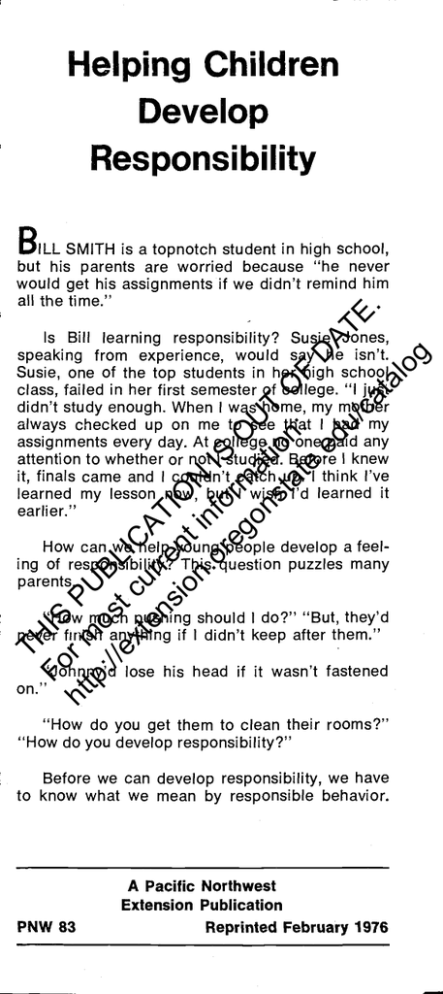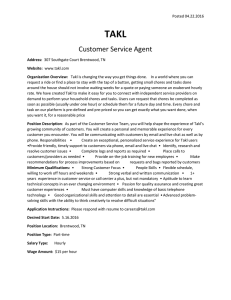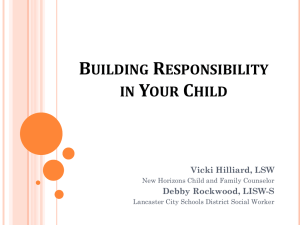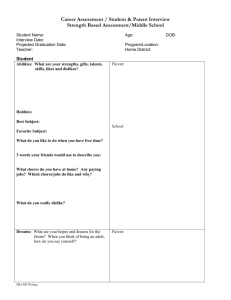Develop Helping Children Responsibility
advertisement

Helping Children Develop Responsibility BILL SMITH is a topnotch student in high school, but his parents are worried because "he never Fo IS ht r m P U tp :// os BL ex t c IC te ur A ns re TI io nt ON n. in or fo IS eg rm O on at U st ion T O at : F e. D ed AT u/ E. ca ta lo g would get his assignments if we didn't remind him all the time." Is Bill learning responsibility? Susie Jones, speaking from experience, would say he isn't. Susie, one of the top students in her high school class, failed in her first semester of college. "I just didn't study enough. When I was home, my mother always checked up on me to see that I had my assignments every day. At college no one paid any attention to whether or not I studied. Before I knew it, finals came and I couldn't catch up. I think I've learned my lesson now, but wish I'd learned it earlier." I How can we help young people develop a feeling of responsibility? This question puzzles many parents. TH "How much pushing should I do?" "But, they'd never finish anything if I didn't keep after them." "Johnny'd lose his head if it wasn't fastened on." "How do you get them to clean their rooms?" "How do you develop responsibility?" Before we can develop responsibility, we have to know what we mean by responsible behavior. PNW 83 A Pacific Northwest Extension Publication Reprinted February 1976 How does responsibility develop? What is responsible behavior? If a child does his chores, does his homework and practicing, keeps clean and neat, doesn't waste money, and does these things when he is told or preferably before he is told, we say he is No child is born responsible. Neither does responsibility develop full blown. A feeling of responsibility develops slowly through the years. responsible. Each person is responsible in some things and irresponsible in others. It depends on the point of view. Before we judge others, we should take a look at responsibility to what and to whom. As children grow, there are many demands on them. It's a difficult decision to know how to sort out responsibilities. The roots of responsible behavior are put down tions, ability to make choices, and willingness to accept the consequences of one's behavior. When we think of responsibility, we have to think of responsibility to what and to whom. Johnny never remembers to hang up his clothes at home or to make his bed. But he never misses a basketball practice or breaks training. Ann likes him because she can count on him taking her to all the school functions. Mother complains because he's "so irresponsible." The coach and his girl friend see him as responsible. How does Johnny see himself? He knows the coach can depend on him. Ann can count on him too. But mothershe's so unreasonable. She doesn't realize a fellow can't do everything. HOw do we feel about responsibility as our children grow? Does a part of our feeling that they are irresponsible stem from the fact that as children grow they become more responsible to others outside the home and less responsible to us? No one can meet all the demands of all people. As parents it's hard to see responsibility to others be- Is it more important to get school work or home work done? Is my responsibility to my friends or to my him. mother? Although responsibility is serious business, it develops best in a pleasant, happy climate. Dilemmas such as these face adults too. Many of us have difficulty in deciding our responsibility to our family and to community organizations. Truly responsible people tend to be happy people. Because they know others like them and care for them, they can be concerned with others. Re- As we think about responsibility, we need to remember that it isn't something you force on someone or legislate. It develops throughout the years. Responsible behavior is really a byproduct of being cared for, of caring for others, and of feel- F IS ht or m P U tp :// os BL ex t c IC te ur A ns re TI io nt ON n. in or fo IS eg rm O on at U st ion T O at : F e. D ed AT u/ E. ca ta lo g Responsibility involves cooperation and consideration. It implies accountability for one's ac- at the very time a child is most irresponsible. In fact, having needs satisfied is the first step along the way to responsible behavior. A human being learns to be thoughtful of others by first having others act considerately and thoughtfully toward sponsibility is a part of a person and his feelings toward himself and others. In other words, a person has to have good feelings about himself before he can be concerned about others. Nearly every meaning of responsibility involves some concern for others and the effect of one's action on others. TH Is this responsibility? Or is it obedience and conformity to the standards of adults? Can a child be obedient and not be responsible? Does responsibility mean more than this? Timing is important in the development of a feeling of responsibility. Scientists have discovered that there is an ideal time to learn thingswhether it be learning to feed oneself or to make one's bed. ing a part of a total situation. Probably the best way to insure responsible behavior is to set a good example. A sense of responsibility is "caught" as well as taught. Since so much of our feeling about children and responsibility revolves around chores, let's take a look at chores and their part in developing responsible behavior. There's no rule of thumb to follow. We have to watch, listen, and learn from the child himself. Each child is not only different from every other person, but he grows at his own rate. The important thing is to take your cue from your child. Too much responsibility too early may help come more important than responsibility to us. a child develop the feeling that he can't do what is Sometimes we judge responsible behavior as irresponsible because we don't consider the "to whom." expected of him. He may feel that he can never measure up. If he's told continually that he's irresponsible, soon he'll believe it. Do chores develop responsibility? Many of us are concerned because today's children don't have enough chores to do to develop responsibility. But is doing chores a guarantee of responsibility? If we take a serious look at the past, we'll discover that some children devel- oped responsibility "in spite of" rather than "because of" chores. Doing chores at homeor assuming some part of the job of keeping a home running smoothly is important for everyone in the family. But there's really no reason why Junior should get stuck with emptying the garbage every day. Maybe this week his job could be to set the table, vacuum the living room, do the dishes, or any one of a dozen things which have to be done in a family. Many parents have found it helpful if family members get together and list the jobs that have to be done. They rank them according to the time Do I work with him on certain jobs? Do I follow through and see that chores are done? Is there a feeling of cooperation? Is the assuming of responsibility fun at our house? and skill necessary and then rotate among all family members. Junior may feel happier about empty- After you've thought through these questions, have a family conference. Sit down with the fam- ing the garbage if dad takes his turn tooand if he's had an opportunity to decide what he'll do view and yours. Fo IS ht r m P U tp :// os BL ex t c IC te ur A ns re TI io nt ON n. in or fo IS eg rm O on at U st ion T O at : F e. D ed AT u/ E. ca ta lo g this week. ily and discuss the situation from their point of Then agree on a realistic plan of action which will help all members of the family grow in re- What you can do to help If you are having trouble with chores at your house, take a look at the total situation. What are the trouble spots? After you've thought about your particular problems, ask yourself some questions. What am I teaching by my present way of handling this situation? sponsibility. Remember that doing chores does not necessarily teach responsible behavior. Doing chores may teach obedience or it may build resentment. Chores can be used constructively to help a child move from a state of irresponsibility to responsibi Iity--providi ng he has developed good feelings about himself and others along the way. TH Am I expecting too much too soon? Is the job interesting and challenging? Does my child have some part in deciding which job he'll do? Are jobs rotated among family members? Have I given J. I. T. (job instruction training) so that he can learn how to do the job well enough to gain satisfaction? Do I reward accomplishment by praise and recognition? Do I evaluate his work on what can be expected of his age level? Prepared by Roberta Frazier Anderson, Oregon State University Extension family life specialist, now retired, in cooperation with Extension specialists in other Western states. Published and distributed in furtherance of the Acts of Congress of May B and June 30, 1914, by the Cooperative Extension Services of Oregon State University, Joseph R. Cox, director; Washington State University, J. 0. Young, director; the University of Idaho, James L. Graves; and the U.S. Department of Agriculture, cooperating.





